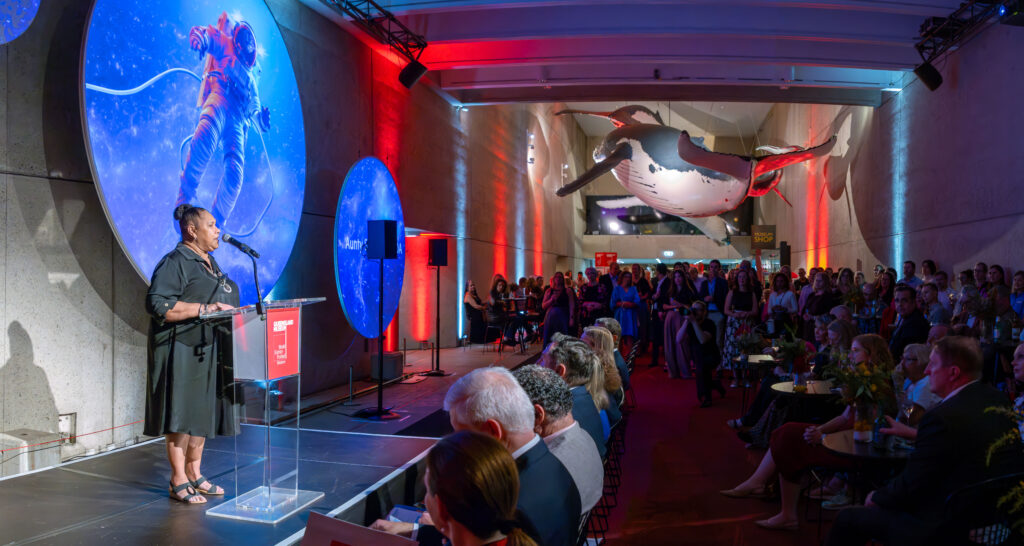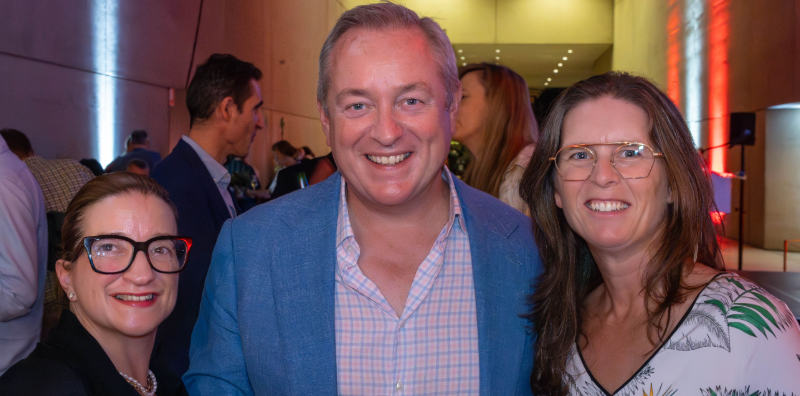Last week, Australian life sciences company, QBiotics Group Limited (QBiotics), renowned for its innovative research and development of treatments for cancer and chronic wounds, is celebrating 25 years of unlocking Queensland’s natural environment at the 10th World Science Festival Brisbane (WSFB).
QBiotics is proudly serving as Program Partner of the WSFB Unseen Worlds art installation (March 21–31, 2025), featuring a captivating visual display of Queensland’s scientific wonders and hidden microscopic worlds.

Through the lens of visual displays, WSFB attendees will gain insight into QBiotics’ approach to drug discovery and development.
Scientists, government officials, and corporate and educational partners Australia-wide will gather for an exclusive WSFB opening event at the Queensland Museum’s Whale Mall, to experience the Unseen Worlds installation of awe-inspiring, large-scale visual projections of rich, microscopic worlds, marking both the 10th anniversary of the WSFB, and the 25th anniversary of QBiotics.

According to QBiotics CEO and Managing Director, Mr Stephen Doyle, Brisbane, the company is thrilled to be participating in the Unseen Worlds exhibition, showcasing the innovation of QBiotics’ proprietary discovery platform, EcoLogic™.
“Unseen Worlds gives us an opportunity to share a small part of the QBiotics story through a visual projection showing how our unique cancer drug rapidly destroys cancer cells.
“For 25 years, QBiotics has been harnessing the power of nature to discover and develop new drugs, bringing them to market, and diversifying treatment options for patients,” said Mr Doyle.
“We are pleased to share a piece of our history with the WSFB attendees, and give them an opportunity to learn more about the Fontainea picrosperma seed, discovered in Queensland’s unique ecosystems.
“QBiotics’ anticancer drug, tigilanol tiglate, originates from the Fontainea picrosperma seed found on the Atherton Tablelands, and is currently registered for canine mast cell tumours in Australia, the USA, the EU and the UK respectively, having now treated more than 30,000 dogs,” Mr Doyle said.
“Tigilanol tiglate is also currently in development for human trials in head and neck cancer and soft tissue sarcoma.”
The QBiotics journey began in a modest basement laboratory in Yungaburra, Queensland, where company co-founders, microbiologist, Dr. Victoria Gordon, and forest ecologist, Dr. Paul Reddell, explored the diversity of nature, and how plants interact with their environments. Their pioneering research strove to understand whether these natural interactions and pathways could be adapted to create innovative medicines for human use.
Access to a diverse range of unique plants, animals and insects found in Queensland’s megadiverse ecosystems, combined with the QBiotics co-founders’ extensive knowledge of how natural ecosystems function and interact, led to the development of EcoLogic™ – a knowledge-based approach that targets plant material with specific activity to discover potential treatments for a range of diseases.
Witnessing the profound impact of cancer on several close family members became the driving force behind Dr. Gordon’s decision to establish, and grow QBiotics.
The now Non-Executive Director, former CEO and Managing Director of QBiotics, channelled this personal experience into a mission to make a difference in the fight against cancer.
“Discovering more effective treatment options with less severe and fewer side-effects for human and animal health has always been our motivation at QBiotics.
“By researching the way plants defend themselves in their environment, we’ve been able to identify molecules with specific disease-targeting abilities,” said Dr. Gordon.
“Plants have developed these extraordinary, elegant systems in order to protect themselves. This is mostly through chemical defence, but these pathways can be researched and used to solve mammalian medical problems.
“In addition to our unique discovery platform Ecologic™, another one of QBiotics’ distinguishing factors is our ability to use extensive, real-word data from our veterinary programs, to inform and minimise the potential risks of moving into human clinical development,” Dr. Gordon said.
“We are currently focusing on a broad range of solid tumours and chronic wounds, both representing areas of significant unmet need in the patient population.
“We have also started expanding into additional, early programs in antibiotics and anti-inflammatories,” said Dr. Gordon.
Chief Scientific Officer (CSO) and Executive Director, Dr. Reddell attributes QBiotics’ success over the past
25 years to the company’s passionate, and dedicated personnel, and the unique discovery platform, Ecologic™.
“For 25 years, QBiotics has explored nature’s rich pool of bioactive molecules, gaining deep knowledge of the natural environment, revealing solutions for those in need.
“Our EcoLogic™ platform has enabled us to use nature’s abundance and remarkable chemical diversity, unmatched by synthetic chemistry, and to provide greater opportunity for the discovery of new pathways to broaden treatment options,” Dr. Reddell said.
“The success of our discovery and development programs is a direct result of the exceptional talent and dedication of our team, including both our company staff and long-term research partners.
“Their passion for science, and willingness to think, and solve problems differently, and the energy generated from collaboration, that is the essence of QBiotics, and the culture that will support our future success,” said Dr. Reddell.
The Unseen Worlds art installation, as part of the WSFB, is open to the public from Friday 21 – Sunday, 30 March, 2025. To attend Unseen Worlds or for more information, head to: worldsciencefestival.com.au.
References
1. Grant EL, Wallace HM, Trueman SJ, Reddell PW, Ogbourne SM. Floral and reproductive biology of the medicinally significant rainforest tree, Fontainea picrosperma (Euphorbiaceae). Industrial Crops and Products. 2017;108:416-22.
2. Cullen JK, Yap P-Y, Ferguson B, Bruce ZC, Koyama M, Handoko H, et al. Tigilanol tiglate is an oncolytic small molecule that induces immunogenic cell death and enhances the response of both target and non-injected tumors to immune checkpoint blockade. Journal for ImmunoTherapy of Cancer. 2024;12(4):e006602.
3. De Ridder TR, Campbell JE, Burke-Schwarz C, Clegg D, Elliot EL, Geller S, et al. Randomized controlled clinical study evaluating the efficacy and safety of intratumoral treatment of canine mast cell tumors with tigilanol tiglate (EBC-46). J Vet Intern Med. 2021;35(1):415-29.
4. Musser ML, Jones PD, Goodson TL, Roof E, Johannes CM. Response to tigilanol tiglate in dogs with mast cell tumors. Journal of Veterinary Internal Medicine. 2024;38(6):3162-9.
5. ClinicalTrials.gov. A Clinical Study to Investigate the Efficacy of Tigilanol Tiglate Directly in Head and Neck Cancer 2025 [Available from: https://clinicaltrials.gov/study/NCT05608876?intr=tigilanol%20tiglate&rank=2].
6. ClinicalTrials.gov. A Clinical Study to Investigate the Efficacy of Intratumoral Tigilanol Tiglate in Soft Tissue Sarcoma, 2025 [Available from: https://clinicaltrials.gov/study/NCT05755113?intr=tigilanol%20tiglate&rank=3].
7. Powell LC, Cullen JK, Boyle GM, De Ridder T, Yap P-Y, Xue W, et al. Topical, immunomodulatory epoxy-tiglianes induce biofilm disruption and healing in acute and chronic skin wounds. Science Translational Medicine.14(662):eabn3758.
8. Panizza BJ, de Souza P, Cooper A, Roohullah A, Karapetis CS, Lickliter JD. Phase I dose-escalation study to determine the safety, tolerability, preliminary efficacy and pharmacokinetics of an intratumoral injection of tigilanol tiglate (EBC-46). eBioMedicine. 2019;50:433-41.

There are no comments